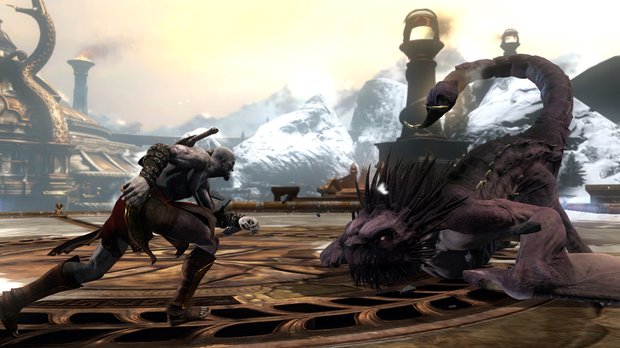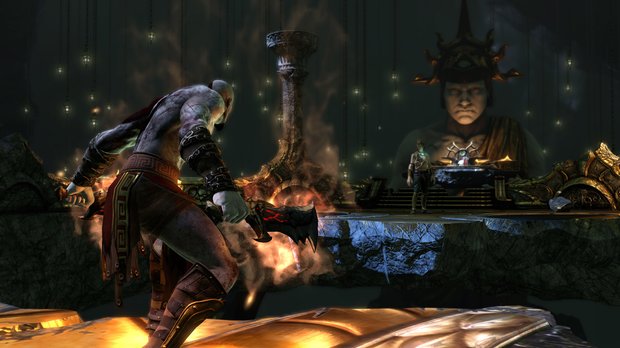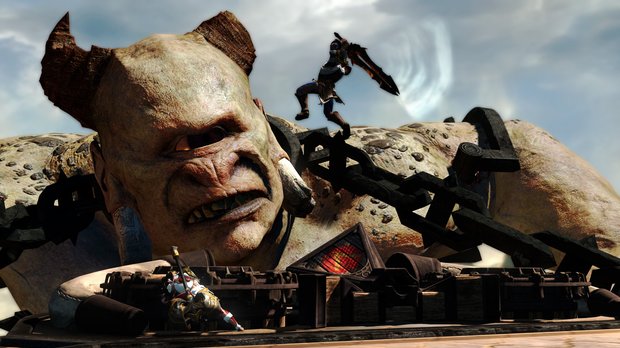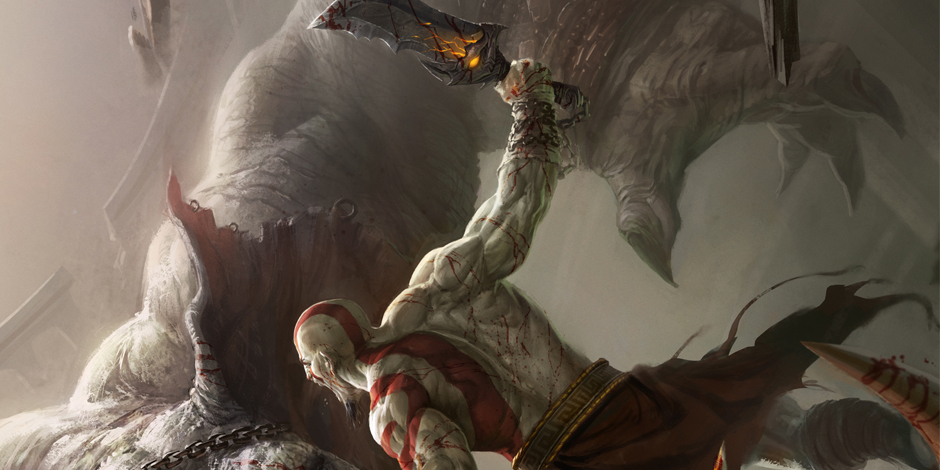GamesRadar+ Verdict
Pros
- +
Absolutely beautiful visuals
- +
Magnificent set-piece encounters and massive battles
- +
Engaging
- +
fast-paced combat
Cons
- -
A lack of personality
- -
Difficulty spikes and occasionally unsatisfying puzzles
- -
Unmemorable multiplayer
Why you can trust GamesRadar+
A few hours into God of War: Ascension, you'll find yourself running atop a massive, mechanical snake battling waves of monstrous goat men. It's marvelous and immense, with gold and blue scales that glisten in the sun, as the serpent's metallic body twists and bends during its ascent through beautiful mountains, garnished with remarkable stone architecture. Slowly, the camera pulls back, revealing the absurd scale of the environment as Kratos becomes smaller and smaller, continuing to tear apart his enemies in a rock opera of blood. It's here, during this unforgettable, awe-inspiring set piece encounter, that you'll realize you have absolutely no idea what's going on.
And for a majority of the game, you won't mind. You'll be too busy slashing at enemies with the Blades of Chaos and taking part in some of the most breathtaking cinematic moments in gaming's history. You'll be sliding down ice-covered corridors at breakneck speeds and leaping between crumbling buildings. The action is unrelenting, keeping you distracted with constant movement instead of relatable motivation or, really, any motivation at all.
"The action is unrelenting..."
Kratos battles some of the most impressive foes he's ever fought during Ascension's eight-hour campaign. Though few actually pull from the Greek pantheon (since those mythical figures need to be alive for Kratos to kill in the sequels, after all), they're absolutely thrilling, punctuated by the series' signature quick-time events that conclude in grandiose displays of violence and brutality. Ascension also introduces a welcome new addition, sidelining QTEs in favor of action-based finishing moves, turning tearing an enemy apart into a mini-game. These scenes are amplified by Ascension's incredible visuals, which are not only the best the franchise has seen, but some of the most impressive on the PlayStation 3. Your attention will be pulled away from the substanceless story and uninteresting characters by big, shiny encounters.
You won't care about the story, and, usually, you won't care that you don't care about the story. But eventually, through attrition and repetition, you'll start to feel like something is off with Ascension's tone. Taking place mere months after Kratos was tricked into murdering his family by Ares, the game provides a glimpse at the Ghost of Sparta before he was consumed by rage. He's a more human protagonist, spending a lot less time bellowing at his enemies about how he's been betrayed and how he's going to get revenge and how much he's going to kill them.

"You won't care about the story, and, usually, you won't care that you don't care about the story."
Kratos' anger has been removed, as promised, but it wasn't really replaced with anything. Ascension feels hollow and motiveless, and it's hard to get excited when the hero himself isn't capable of mustering up any enthusiasm. You'll be dragged from remarkable location to remarkable location, never knowing why you're there or what you're supposed to do. Ascension doesn't flesh out Kratos' life or give you better insight into why he becomes the ferocious avatar of anger. Instead, it just happens. Kratos isn't deeper for it, he's still just a blender--an excuse for you to spin around and act as a whirlwind of chains and blood and meat.
God of War's combat hasn't changed all that much over the past decade because it didn't need to. Slicing apart foes is infinitely rewarding, fulfilling your deepest power fantasies. Ripping the wings off of harpies and snapping off minotaur horns is brutal, but the lack of new, interesting weapons is a disappointment. Kratos can empower his blades with different elemental types aligned to the different gods, but these are hardly a replacement for finding new toys to play with.

"Kratos' anger has been removed... but it wasn't really replaced with anything."
The only other actual weapons you can equip besides the Blades of Chaos are swords, hammers, and javelin scattered around the world, but the fact that they only last for a few attacks limits their use. It's well-paced, for the most part, save for a few difficulty spikes that'll test your patience, rather than your skills--including one that's easily the most difficult section in any God of War game to date, for all the wrong reasons.
Kratos spends nearly as much time killing as he does pushing crates, pulling levers, and climbing through intricate and well-designed levels. Each location is a puzzle within itself, enhanced by the addition of the Amulet of Uroborus, a tool that allows you to either give life to or decay an object. Rebuilding destroyed bridges is visually enthralling, but you'll never feel all that challenged--or rewarded--by Ascension's puzzles. In the rare event that they're more complicated than climbing a ladder and pushing the button, the solution is spoiled by a go-this-way-you-idiot camera pan. Sometimes, puzzle solutions don't really make much sense, and you'll feel more annoyed than satisfied when you figure out how to open the locked door that's been preventing your progress for 30 minutes.

"Sometimes, puzzle solutions don't really make much sense..."
Also somewhat disappointing are the newly added multiplayer features, which are held up by clever level design and strong game modes, but smacked down by uninteresting gameplay. It sounds great in theory, but in practice it turns out there's nothing less fun than being beat up by someone as powerful as Kratos. God of War's combat is at its best when you're battling many things smaller than you or few things bigger than you; fighting enemies that are just as strong as you isn't all that engaging. The exception is Trial of the Gods, a two-player cooperative mode that teams up warriors to take down waves of enemies, but even then it's not going to hold your attention for too long.
God of War: Ascension is confident, executing the franchise tropes flawlessly with an amount of self-awareness not often seen in gaming. It knows it's good--it knows it doesn't have to try hard to be good--but it struggles to be anything more than that. While it's worth experiencing for the massive battles, remarkable cinematic moments, and strong combat, it doesn't feel like a necessary chapter in the God of War franchise. As it would turn out, the God of War isn't worth much as a mere mortal.
More info
| Genre | Action |
| Description | Find out what Kratos was like before he was the rage-filled God of War in this prequel to the hit series. |
| Franchise name | God of War |
| UK franchise name | God of War |
| Platform | "PS3" |
| US censor rating | "Mature" |
| UK censor rating | "" |
| Alternative names | "God of War IV" |
| Release date | 1 January 1970 (US), 1 January 1970 (UK) |
Hollander Cooper was the Lead Features Editor of GamesRadar+ between 2011 and 2014. After that lengthy stint managing GR's editorial calendar he moved behind the curtain and into the video game industry itself, working as social media manager for EA and as a communications lead at Riot Games. Hollander is currently stationed at Apple as an organic social lead for the App Store and Apple Arcade.




